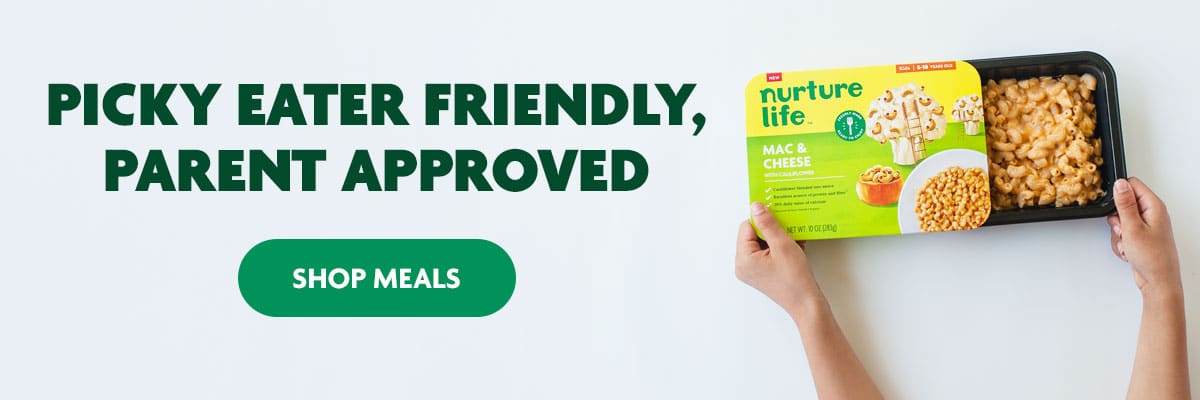As children, many of us grew up hearing some variety of this common refrain: “No dessert until you finish your peas!” Or maybe, “No TV unless you clean your plate!” Without even realizing it, we may now be passing down these same messages as we learn to parent our own kids.
The problem with food-related reinforcement—as true today as it was back then—is that it doesn’t work! In fact, rewarding our kids for eating often achieves the very opposite of what we intend. It tends to make picky eaters more resistant to new foods and muddles the message of positivity, encouragement and confidence that we hope to establish as they grow up and grow into their own eating habits.
As a registered dietitian, my clinical practice with early childhood nutrition has shown me time and time again that rewarding kids for eating (or “bribing” them, you might say) just doesn’t work. Here’s why.
6 Reasons to Avoid Bribing Your Kids at Mealtime
1. It Prevents Kids From Learning to Listen to Their Bodies.
The most important reason not to reward kids for eating is that it can prevent them from understanding their own hunger and fullness cues. Instead of learning to listen to their bodies to determine whether they’re hungry or full, kids will begin to look to the external reward. The bigger the reward (maybe it’s a new toy, an extra 30 minutes of fun before bed or a special dessert), the more motivated kids are to eat.
Even if our reward system for kids focuses on encouraging only “healthy” foods, the pattern is pervasive. Once kids stop honoring their own hunger/fullness cues, all of their eating patterns may become confused—not just when veggies are on the table. The less kids can hear what their body is telling them, the greater their risk for developing unhealthy eating patterns as they get older.
2. It’s a Slippery Slope.
To be an effective habit-forming tool, a reward must have clear terms: if your child does this, then this results. Consistency is key—but it’s also very hard! We all want our kids to be happy, and once we’ve established the presence of mealtime rewards, it’s easy to start moving the goalposts little by little.
For example, maybe we start by saying that our kids will get 15 minutes of TV if they eat all the broccoli. As that begins to feel impossible, maybe we lower the bar to just four pieces of broccoli. Then finally maybe just one bite. In this case, our kids have learned that the rules are flexible and that they might get the reward anyway, even without eating the broccoli. Meals can then turn into a power struggle—and you don’t need me to tell you that iron-willed toddlers are very good at beating out tired parents!
3. It Can Muddle Relationships Between Feeder and Eater.
When you introduce rewards into eating, you aren’t just changing your child’s relationship with food—you’re changing your relationship with your child. As you instate a reward system, your child may start to view eating as an easy way to please you. This, in turn, shifts the focus away from teaching your child to listen to their body and towards a focus on gaining approval. The more they seek approval, the less they may naturally ask themselves, “Am I full? Does my body need to keep eating?”
4. It Increases Food Anxiety.
It’s natural for us as parents to want our kids to fulfill their potential, which includes a healthy, active body. But if we focus so much on an elaborate reward system (like one fun activity for every three veggies, or one sticker for every two bites), we may build up too much fixation on our kids’ eating habits.
We may start rewarding kids whenever they eat anything at all, or we may turn ourselves into a short-order cook who makes whatever our kids want just to fill their stomach. It becomes exhausting and may establish a sense of anxiety around meals (for both kid and parent!).
5. It Builds Food Resentment.
Opposite to giving rewards, withholding privileges (i.e. negative reinforcement) can also be troublesome for kids. Removing access to toys or limiting fun activities will further frustrate our kids, not only making them uncomfortable with the new or “yucky” food but also taking away their pastime, which will lead to more anger and disappointment.
Increased resentment around food is not a positive experience for the child, nor is it ever going to make mealtime pleasurable. And as upset kids dig their heels in, the power struggles will only get worse.
6. It Becomes a Habit.
Learning to eat new foods can be a tricky time in infancy, for both the parent and the child. Some kids are quite accepting as infants but then begin to develop picky eating habits as a toddler, which can be equally frustrating and confusing. In both cases, rewarding children for eating often starts at a very early age. Once it becomes a habit, it’s very difficult to break—even as your child gets older and even when we can see that the positive or negative reinforcement isn’t really working.
What to Do Instead: Keep Meals Relaxed and Reward-Free
If you’ve been rewarding your kids for eating, you aren’t alone! Many, many parents use this strategy, and you shouldn’t feel bad if the habit has made its way into your family’s mealtime routine. Taking small steps to remove the reinforcement from meals will go a long way to helping your kids develop a more positive relationship with food. It’s never too late to build new habits for your family (and you’ll be modeling a great example for your kids in the process!).
Here are a few simple ways to approach meals without resorting to positive or negative reinforcement.
1. Talk About the Food.
Positive reinforcement doesn’t have to be a shiny new toy; it can be as simple as verbal praise for “doing a good job” with food. It’s natural to want to highlight our kids’ positive behaviors, but too much praise may lead your child to listen more for your approval than their own hunger/fullness cues.
Rather than making a big commotion about food, it’s best to have a relaxed atmosphere. Instead of praising your child directly, try starting a laid-back conversation about the food. If your child tries a bite of broccoli, try a piece yourself and describe what it tastes like to you or what you think would be good alongside the broccoli the next time your child tastes it.
Instead of any kind of reinforcement (which can often feel like pressure), you’ll be encouraging a sense of wonder and discovery around food. If your child hates the food, ask why! Try to make it fun and give your little one space to say what’s icky and, more importantly, why.
2. It’s Okay to Make Meals Fun!
Even without direct rewards or verbal praise, you can still have fun while eating! Some of our favorite picky eater tools involve cute plates, fun character food picks and adorable mealtime buddies that help kids explore the many colors, textures, tastes, smells and other sensations of food.
The key is to spur some interest without resorting to gadgets that will overly distract your child from the experience of eating. Something simple like a board-game-themed dinner tray can take the focus off how many bites your child is eating (for you as the parent) or how “ewwww!” the broccoli smells (for your kid). If you order Nurture Life’s healthy kids meals, you can easily reuse our meal packages to add some whimsy and creativity to meals, too!
If you do use any kind of themed plates, table toys or other game elements at meals, try to think of them first and foremost as a communication tool. Use them to ask questions, build an imaginative story, talk about different foods and have fun together.
3. Experiment With Picky Eater Strategies.
Many parents resort to mealtime bribes to get their kids past a picky eating phase. If your little one is suddenly refusing to eat anything green, leafy or non-chicken-nugget, then you may want to try out some picky eater strategies. There are tons of ways to introduce new foods (or to re-introduce old foods to newly picky eaters) that don’t involve any kind of reward system for kids.
Here are a few helpful resources to get started:
- Trying one new food at a time, every other day
- Making your kitchen more kid-friendly
- Involving your child at mealtime
- Serving picky eater-approved veggies
Different strategies work for different kids, so it may take some time to find what works best for you. And research shows that it can take 6–15 times before a child accepts a new food, so patience and persistence are key. Even when it doesn’t feel like it’s working, remind yourself that you’re on the right track!
Starting at a young age, it’s important for children to learn to listen to their bodies—to eat when they are hungry, to stop when they are full and to view food as energy that fuels them throughout the day. By moving away from food-related reinforcement and toward a more open, curious and pressure-free approach to meals, you’ll be teaching your child how to nourish their body now and for a lifetime.
If you have any questions about building healthy, independent eating habits for your kids, please reach out to me and Nurture Life’s other child nutrition experts at support@nurturelife.com!
The post Rewarding Your Kids for Eating Doesn’t Work. What Does? appeared first on Nurture Life.


